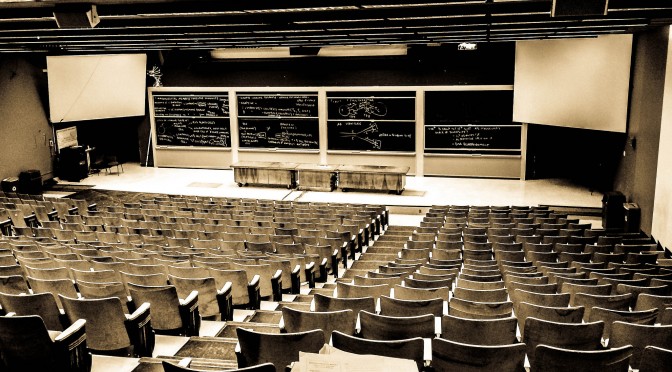Please join us for the third workshop of the Spring 2015 Term:
Educators: Bridging the Ideal and Non-Ideal Divide
Jennifer M. Morton, Department of Philosophy, City College of New York
Tuesday, February 24th, 2015, 4:30-6:00pm
Location: Room 7113 (GC Philosophy Department Thesis Room)
Please see the abstract for the talk below.
Educators: Bridging the Ideal and Non-Ideal Divide
Recently, the distinction between ideal and non-ideal theory has been a topic of central interest to political philosophers and philosophers of education. The divide is often thought to map a difference in theoretical methodology in so far as ideal theorists derive their theories under a different set of assumptions than non-ideal theorists. Political theorists who favor ideal theories defend the value of developing theories of justice that assume full compliance, complete and universal virtue, or unfeasible political conditions. Political theorists who favor non-ideal theory argue that ideal theory is hopeless, irrelevant, or unnecessary to the achievement and development of feasible political goals. These two methodological commitments are not on the face of it incompatible or in tension with each other. Consequently, the ecumenical position suggests that ideal theory can be harmoniously pursued alongside non-ideal theory. They are simply two different theoretical tasks. But this way of understanding what divides ideal from non-ideal theorizing misrepresents the central issue as a mere academic concern for theorists. In so doing, it ignores the much deeper way in which these two ways of thinking about justice pervade our experiences as agents in the moral and political sphere and can lead to practical tensions.
In this paper, I discuss educators as a prime exemplar of agents who not only experience the tension between ideal and non-ideal ways of thinking, but for whom understanding and coming to terms with this tension is of great practical import. I argue that it is central to the educator’s role as educator and as citizen to engage in ideal and non-ideal thinking. This is because the educator is essentially engaged in two tasks. The first task is educating future citizens. In so far, as the educator is involved in this task he is playing a role in making certain future social facts true. These facts are some of the ones on which the justice of our future society supervene. The second task an educator is engaged in is preparing students with the skills and knowledge they need to navigate the world as they will find it. In pursuing this task, the educator is assuming certain social facts, some of them unjust. These two goals lead to difficult tensions in how educators carry out their work. I argue that this tension can be best resolved if we understand the ideal theorizing engaged in by educators as an expression of respect towards his fellow citizens. I argue that this expressive component is crucial to the educator’s role as educator and as citizen.
In section I, I elucidate the ideal/non-ideal distinction. In section II, I describe three examples of educators that show ideal and non-ideal thinking at work. In section III, I argue that it is essential to the role of an educator to engage in both ideal and non-ideal thinking. In the fourth section, I offer a defense of the importance of the expressive value of ideal thinking. In the final section, I argue that political theorists can learn something important about the ideal/non-ideal divide by reflecting on the case of educators.



